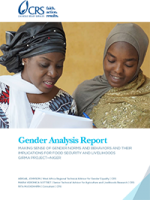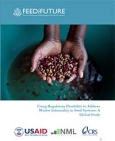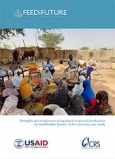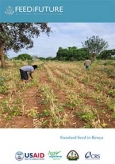Evaluations/Assessments | May 25, 2023
Girma Gender Analysis Report
The Girma program—meaning ‘dignity, prestige, and growth’ in Hausa—is funded by the United States Agency for International Development/ Food for Peace (USAID/ FFP) and implemented by Catholic Relief Services (CRS) and its partners—Education Development Center (EDC), Community Development Assistance (ADC in French), Institute for Reproductive Health (IRH) at Georgetown University, Via Mobile (VIAMO), International Crops Research Institute for the Semi-arid Tropics (ICRISAT), and Development for Well-being (DEMI-E in French). This 5-year multisectoral program aims to improve and sustain food and nutrition security with gender responsive and transformative approaches in approximately 600 communities across 11 communes in the Magaria and Dungass departments of Zinder, Niger.
Girma conducted this gender analysis to meet evidence gaps directly relevant to the program’s theory of change in order to refine its implementation strategies and approaches. The gender analysis has 5 research objectives:
1. To better understand the root causes and motivations of targeted gender norms and behaviors, including male-dominated decision-making patterns and early, child, and forced marriage, in addition to those outlined in research questions below.
2. To estimate levels of perceived Intimate Partner Violence prevalence, identify the root causes and effects of IPV, as well as key influencers and emergent practices for prevention.
3. To better understand intrahousehold gender and power dynamics to contextualize project interventions for various household types and members.
4. To identify main barriers, opportunities and emergent practices for promoting the active and transformative participation of women and youth in the public sphere.
5. To further investigate women’s role in households’ livelihood systems, including their access to and control over productive resources (i.e. land, money, animals, labor, inputs and time), and how this influences livelihood strategies and outcomes.
This study used a mixed methods approach using SenseMaker as the core method for data collection combined with survey questions. In addition, after an initial round of primary analysis, information gaps were explored during collective interpretation workshops with focus groups of male and female respondents, project staff,and local stakeholders. CRS took several measures to avoid causing harm to staff or respondents in line with World Health Organization guidelines (WHO, 2001) and obtained approval from the Nigerien Ministry of Health’s Ethical Board to conduct the study.





